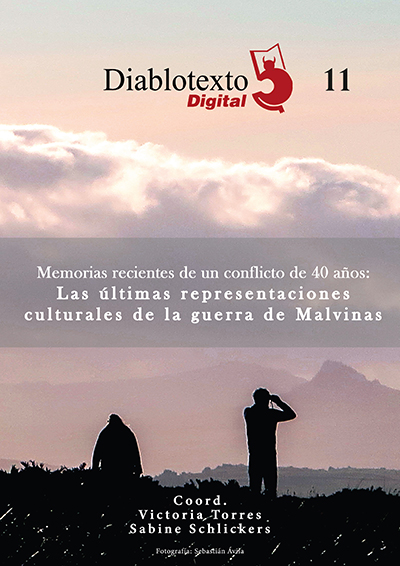The exact shape of the islands by Daniel Casabé and Edgardo Dieleke (2012): non eternal returns to a body-territory
DOI:
https://doi.org/10.7203/diablotexto.11.24498Keywords:
Malvinas Islands, Malvinas War, memories, mourning, bodies Abstract
Abstract
The exact shape of the islands, directed by Daniel Casabé and Edgardo Dieleke (2012), starring Julieta Vitullo, also the co-writer of the film, documents two trips to the Malvinas Islands in 2006 and 2010 from a feminine, vitalist perspective. The contribution analizes the film as a vehicle of intimate and public traumatic memories and mourning. It suggests that the documentary continues a way of thinking “Malvinas” centered on the individual and collective body that León Rozitchner inaugurated in 1982, and reflects on the present day islands from the standpoint of what Verónica Gago (2019) understands as the vital key of a body-territory.
 Downloads
Downloads
 References
References
Bernetti, Jorge Luis y Giardinelli, Mempo (2003). México: el exilio que hemos vivido. Memoria del exilio argentino en México durante la dictadura 1976-1983. Quilmes: Universidad Nacional de Quilines.
Bonino, Luis (2002). “Masculinidad hegemónica e identidad masculina”, Dossier Feministes, n.º 6, pp. 7-35.
Cvetkovich, Ann (2018). Un archivo de sentimientos. Trauma Sexualidad y culturas públicas lesbianas. Barcelona: Ediciones Bellaterra.
Dieleke, Edgardo (2020). “Malvinas miscellanea: notes on a diary written while shooting a film in these remote islands”. En G. Mira and F. Pedrosa (eds.), Revisiting the Falklands–Malvinas Question: Transnational and Interdisciplinary Perspectives. London: University of London Press, pp. 127–39.
Feierstein, Daniel (2012). Memorias y representaciones. Sobre la elaboración del genocidio. Buenos Aires: Fondo de Cultura Económica.
Gago, Verónica (2019). La potencia feminista. O el deseo de cambiarlo todo. Ciudad de Buenos Aires: Tinta Limón.
Israel, Alejandro (Prod.) Casabé, Daniel, Dieleke, Edgardo (Dir.) (2012). La forma exacta de las islas. Argentina: Instituto Nacional de Cine y Artes Audiovisuales.
Jelin, Elizabeth (2002). Los trabajos de la memoria. Madrid: Siglo XXI Editores.
La Capra, Dominick (2006). Representar el Holocausto. Historia, teoría, trauma. Buenos Aires: Prometeo.
Lapoujade, David (2016). Deleuze. Los movimientos aberrantes. Buenos Aires: Cactus.
Martínez, Diego (2015). “Piratas con licencias de Malvinas”, Página 12, 1 de junio de 2015. Disponible en <https://www.pagina12.com.ar/diario/elpais/1-273944-2015-06-01.html> [Fecha de consulta: 15 de marzo de 2022].
Paez, Florencia y Porta, Patricio (2022). “Construyendo una memoria colectiva: recopilación coral de testimonios sobre la cuestión Malvinas”. Ponencia presentada en la Mesa n.º 48 “Ecos de Malvinas: Historia, memorias y representaciones a cuarenta años del conflicto bélico”, XIII Seminario Internacional de Políticas de la Memoria, Centro Cultural Haroldo Conti, 27 al 30 de abril de 2022.
Picco, Ernesto (2020). Soñar con las Islas. Una crónica de Malvinas más allá de la guerra. Rosario: Prohistoria ediciones.
Vitullo, Julieta (2012). Islas imaginadas. La guerra de Malvinas en la literatura y el cine argentinos. Buenos Aires: Corregidor.
Vitullo, Julieta (2020a). ‘The Malvinas journey: harsh landscapes, rough writing, raw footage’. En G. Mira and F. Pedrosa (eds.), Revisiting the Falklands–Malvinas Question: Transnational and Interdisciplinary Perspectives. London: University of London Press, pp. 111–25.
Vitullo, Julieta (2020b). “Broken Waters”, The Normal School. Disponible en: <https://www.thenormalschool.com/may-2020-pop-culture-issue-1> [Fecha de consulta: 18 de marzo de 2022].
Rozitchner, León [1985] 2005. Malvinas: de la guerra sucia a la guerra limpia. El punto ciego de la crítica política argentina. Buenos Aires: Editorial Losada.
Downloads
Published
How to Cite
-
Abstract478
-
PDF (Español)139
Issue
Section
License
Licencia de reconocimiento de Creative Commons “Reconocimiento - No Comercia l- Sin Obra Derivada
Authors who publish with this journal agree to the following items:
The authors will keep their copyright and guarantee the journal the right of first publication of their work, which will be simultaneously subject to the Creative Commons license that allows third parties to share the work indicating its author and its first publication in the journal. The authors may adopt other non-exclusive license agreements to distribute the version of the published work (e.g., depositing it in an institutional telematic file or publishing it in a monographic volume), with an acknowledgment of its initial publication in this journal. The authors are allowed and encouraged to disseminate their work through the Internet (e.g., in institutional telematic archives or on their website) before and during the submission process, which can produce interesting exchanges and increase citations of the published work. (See Effect of Open Access)




